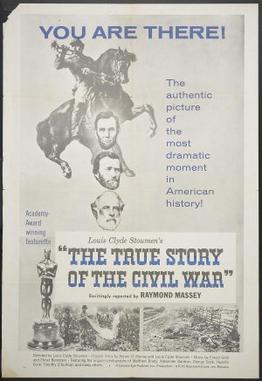Related Research Articles

Arthur Lipsett was a Canadian filmmaker with the National Film Board of Canada. His short, avant-garde collage films, which he described as "neither underground nor conventional”, contain elements of narrative, documentary, experimental collage, and visual essay. His first film, Very Nice, Very Nice, was nominated for an Academy Award.
Charles Eli Guggenheim was an American documentary film director, producer, and screenwriter. He was the most honored documentary filmmaker in the academy history, winning four Oscars from twelve nominations.
The 34th Academy Awards, honoring the best in film for 1961, were held on April 9, 1962, hosted by Bob Hope at the Santa Monica Civic Auditorium in Santa Monica, California.

Sky Above and Mud Beneath, also released as The Sky Above –The Mud Below, is a 1961 French documentary film. It won the Academy Award for Best Documentary Feature and was entered into the 1961 Cannes Film Festival.
Surogat is a 1961 Yugoslavian animated comedy short film by Croatian director Dušan Vukotić, produced by Zagreb Film, then a Yugoslav film production company. The film is also known by several other names in other languages: Cyррогат, Der Ersatz, Le Succēdanē and Surrogatto.
Hilary Tjader Harris was a documentary filmmaker, one of the pioneers of time-lapse photography. The documentary, Seawards the Great Ships, directed by Harris, won the Academy Award for Best Live Action Short Film in 1962. The Squeeze (1964), a short experimental film about overpopulation won a Golden Gate Award for best fiction at the San Francisco Film Festival in 1964.

Seawards the Great Ships is a 1961 British short documentary film directed by Hilary Harris. It won an Oscar in 1962 for Best Short Live Action Subject, the first Scottish film to win an Academy Award.
Toward Independence is a 1948 American short documentary film about the rehabilitation of veterans with spinal cord injuries. Army Surgeon General Raymond W. Bliss received the award. In 1949, it won an Oscar for Documentary Short Subject at 21st Academy Awards. The Academy Film Archive preserved Toward Independence in 2005.

So Much for So Little is a 1949 American animated short documentary film directed by Chuck Jones and Friz Freleng. In 1950, it won an Oscar at the 22nd Academy Awards for Documentary Short Subject, tying with A Chance to Live. It was created by Warner Bros. Cartoons for the United States Public Health Service. As a work of the United States Government, the film is in the public domain. The Academy Film Archive preserved So Much for So Little in 2005. Produced during the Harry S. Truman administration, it attained renewed relevance during the modern Medicare for All movement in the United States nearly seven decades later.
Why Korea? is a 1950 American short documentary film produced by Edmund Reek at the request of the Secretary of Defense Louis Johnson and used newsreel footage to explain the Korean War. In 1951, it won an Oscar for Documentary Short Subject at the 23rd Academy Awards. The Academy Film Archive preserved Why Korea? in 2005.

The True Story of the Civil War is a 1956 American short documentary film directed by Louis Clyde Stoumen.
Dylan Thomas is a 1962 British short black-and-white documentary film directed by Jack Howells about the Welsh poet and writer Dylan Thomas, narrated by Richard Burton. It won an Oscar at the 35th Academy Awards in 1963 for Documentary Short Subject. The Academy Film Archive preserved Dylan Thomas in 2000.
Chagall is a 1963 short documentary film directed by Lauro Venturi which focuses on the work of artist Marc Chagall. It won an Oscar at the 36th Academy Awards in 1964 for Documentary Short Subject. The Academy Film Archive preserved Chagall in 2008.
Interviews with My Lai Veterans is a 1970 American short documentary film directed by Joseph Strick featuring firsthand accounts of the My Lai Massacre. It won an Oscar at the 43rd Academy Awards in 1971 for Best Documentary. The Academy Film Archive preserved Interviews with My Lai Veterans in 2002.
Breaking the Language Barrier is a 1961 American short documentary film. It was nominated for an Academy Award for Best Documentary Short. Hermon Lee Knox served as Director of Photography.
Cradle of Genius is a 1961 Irish short documentary film directed by Paul Rotha on the history of the Abbey Theatre. It was nominated for an Academy Award for Best Documentary Short.
Kahl is a 1961 West German short documentary film about the Kahl Nuclear Power Plant. It was nominated for an Academy Award for Best Documentary Short.
The Man in Gray is a 1961 Italian short documentary film produced by Benedetto Benedetti. It was nominated for an Academy Award for Best Documentary Short.
Eustace Lycett was a British special effects artist who worked on attractions at Disneyland from the 1960s, such as Great Moments with Mr. Lincoln and Rocket to the Moon, as well as contributing to Disney animation.
References
- ↑ "The S.S. Hope Begins Its Journey for Peace". Business screen magazine. Vol. 22, no. 3. 1961. Retrieved April 1, 2021.
- ↑ "Project Hope" . Retrieved April 20, 2020.
- ↑ "The 34th Academy Awards (1962) Nominees and Winners". oscars.org. October 5, 2014. Retrieved May 24, 2019.
- ↑ "Preserved Projects". Academy Film Archive.